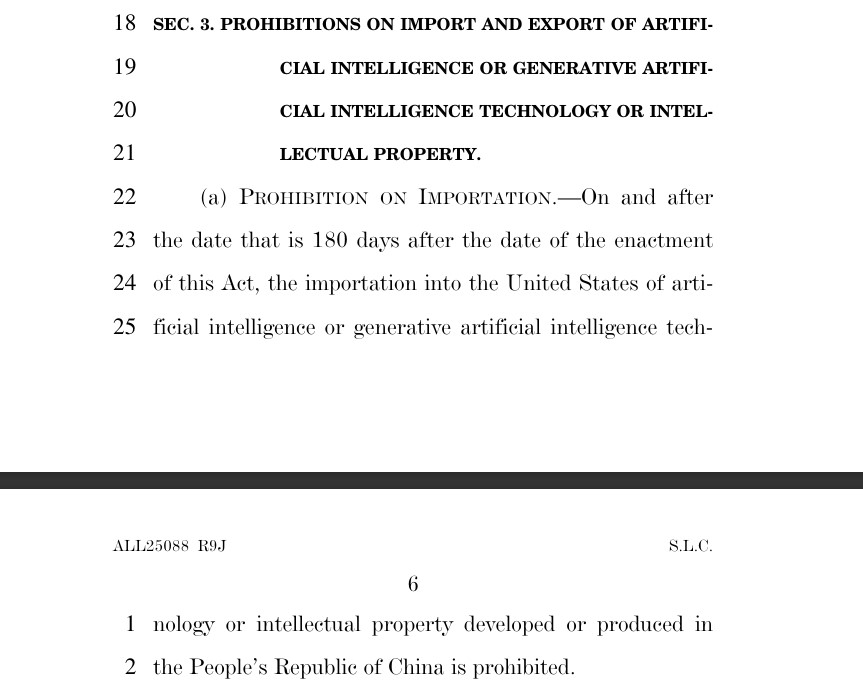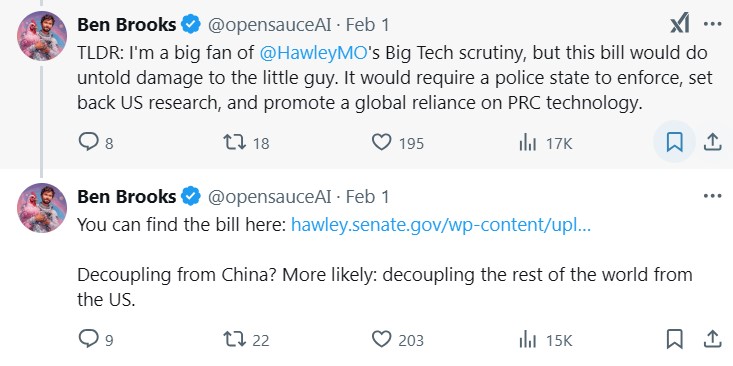US senator introduces bill that could criminalize downloading DeepSeek AI
The bill could lead to up to 20 years of jail time and fines of $1 million for individuals and $100 million for companies.
U.S. Senator Josh Hawley, a Republican from Missouri, has introduced a bill that seeks to ban the import and export of artificial intelligence technology between the U.S. and China, citing concerns over national security.
The legislation, called the Decoupling America’s Artificial Intelligence Capabilities from China Act, does not specifically name the Chinese AI company DeepSeek, but it aims to safeguard U.S. intellectual property and prevent foreign competitors from accessing technologies that could pose a security risk.
If passed, the bill would make it illegal for Americans and U.S. companies to download DeepSeek, an AI chatbot similar to OpenAI’s ChatGPT.

Hefty fines for individuals and companies
Under the proposed bill, violations would carry severe penalties. Individuals could face fines of up to $1 million, while companies could be fined up to $100 million.

Additionally, violators would be required to forfeit any “license, contract, subcontract, grant, or public benefit” received from any federal agency. The bill also stipulates a penalty of up to 20 years in prison for those who violate it.
In a statement, Hawley emphasized that every dollar and gigabyte of data invested in Chinese AI would be used against the U.S., further adding:
“America cannot afford to empower our greatest adversary at the expense of our own strength. Ensuring American economic superiority means cutting China off from American ingenuity and halting the subsidization of CCP innovation.”
If the bill is enacted, Americans would be prohibited from importing or exporting AI technology to and from China. It would also bar U.S. companies from conducting AI research in China or collaborating with Chinese companies on AI projects. Additionally, U.S. companies would be restricted from investing in AI development within China.
The emergence of DeepSeek AI has sparked worldwide concerns over data privacy, with Italy banning the AI chatbot due to inadequate data protection measures. Other regulators have followed Italy’s lead, urging DeepSeek developers to disclose their data practices.
New AI bill would “kill” open source
While the bill claims to protect U.S. interests, not everyone agrees with its approach. Ben Brooks, a fellow at Harvard’s AI Research, argued that the bill would “kill open-source.” He called it the “most aggressive legislative action on AI” to date.
Brooks, who previously served as the head of public policy for Stability AI, warned that the bill would hinder U.S. research and create a divide between the U.S. and the rest of the world.

Andy Ayrey, creator of the AI chatbot Truth Terminal, shared similar concerns. He stated that the bill would “slow Western progress in AI” more than it would harm competitors.
Ayrey suggested, “Far better to open-source model weights and data sets with prosocial, cooperative, and democratic values that will naturally influence international models.”








